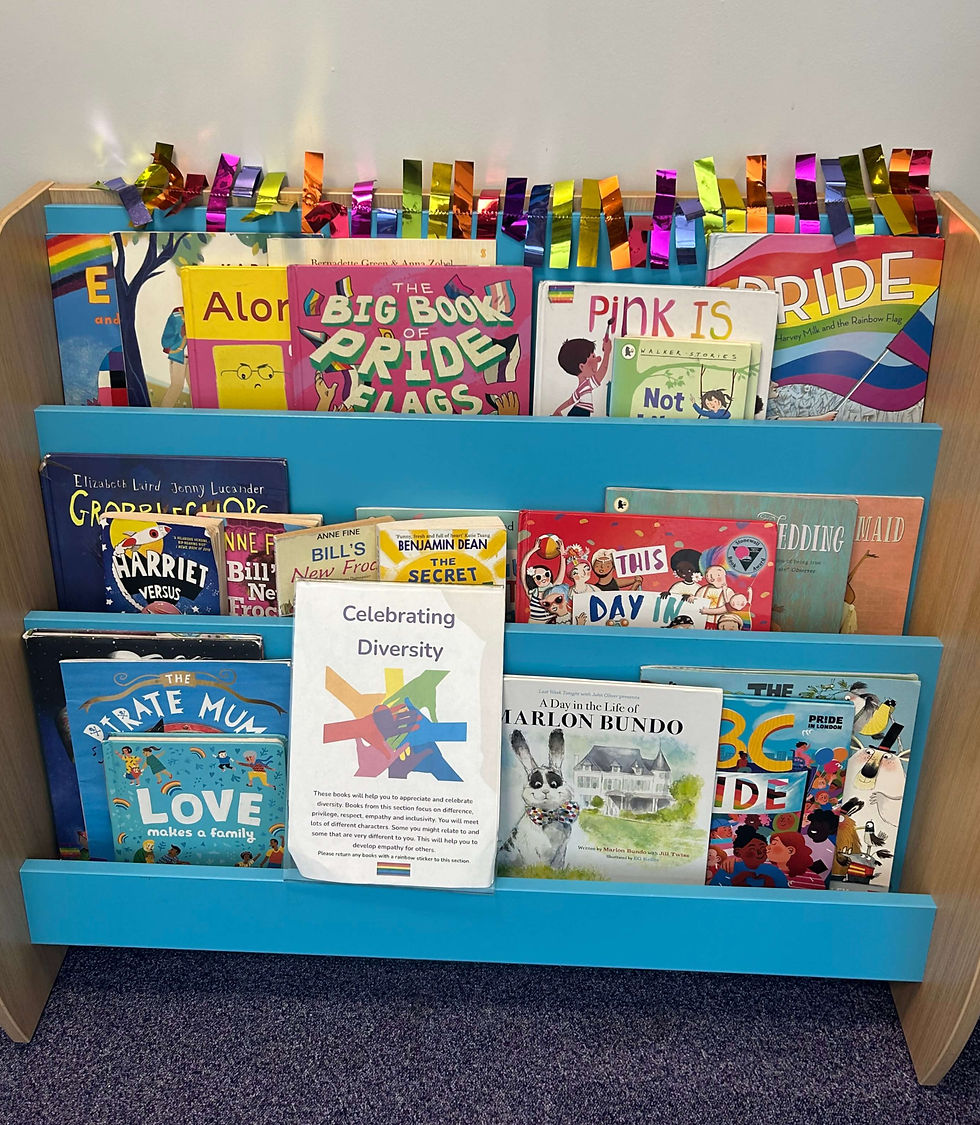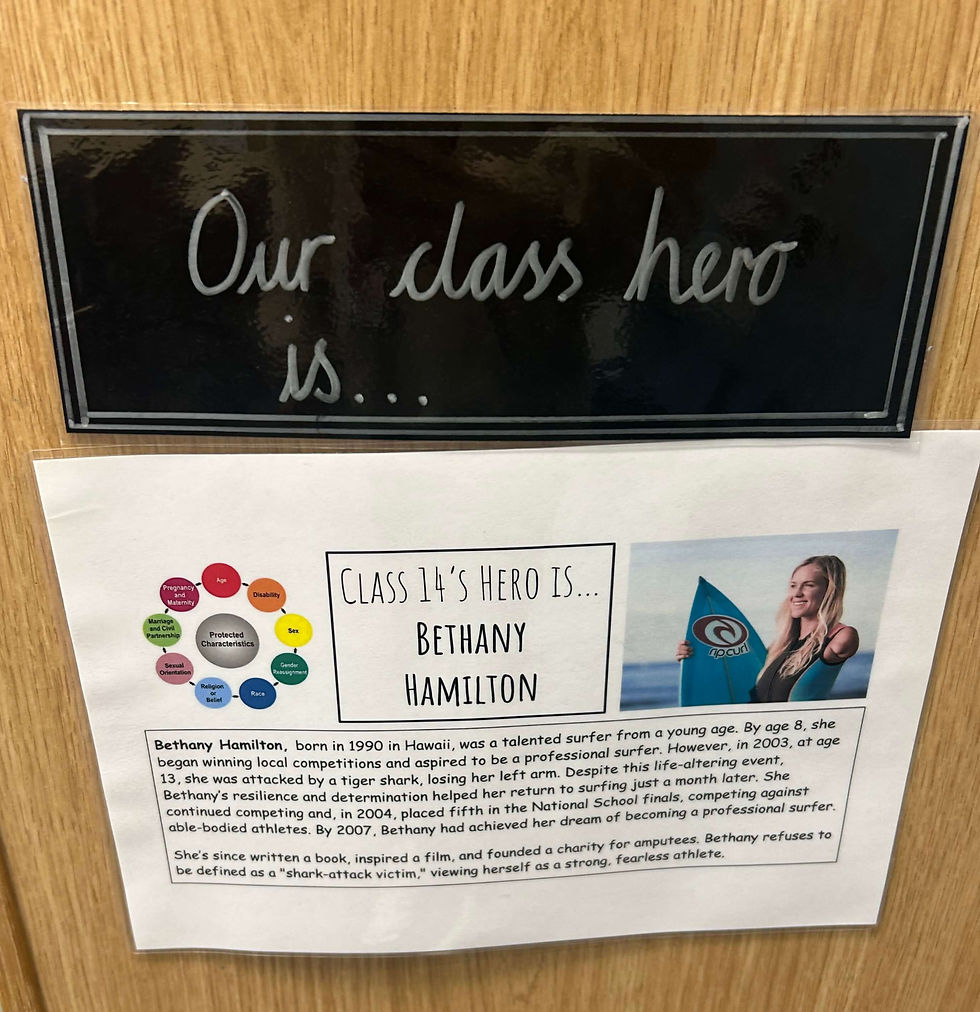How we Made our School More Inclusive
- Kate Williamson
- Oct 30, 2024
- 3 min read
Updated: Mar 13
By Guest Blogger Kate Williamson, Darras Hall Primary School
Darras Hall Primary in Northumberland, England, won the Primary School Diversity Award from Just Like Us earlier this year. In the past two years, the school has been on a journey to transform its curriculum and provision to make it an inclusive and nurturing environment for children to celebrate their individuality and diversity. I’m Kate Williamson, Year 3 teacher and Diversity Council Lead, and I wanted to tell you how we used and incorporated Pop’n’Olly resources to support this.

Two years ago, at the beginning of our journey, we identified three main areas that we wanted to develop:
• Our staff’s knowledge
• Our children’s knowledge
• Our parents’ knowledge
Initially, we audited what the staff at Darras Hall already knew about the Equality Act and how to support diversity and inclusion. We also had very open and honest discussions about what training and support staff needed in order to feel more comfortable tackling issues regarding inequality, discrimination and prejudice and consequently, support our children and families.
The Pop’n’Olly resources, under the Teacher Training tab, provided a great starting point for having these discussions, making staff aware of negative/anti-LGBT+ language and introducing the Equality Act. They can be used for whole-staff training or you can nominate one member of your staff team to be your Diversity Champion and relay information to others. In our school, we opted to have two champions, in different key stages, so staff felt as though they could come and ask questions without fear or judgement.
We then created our Diversity Council. Children met every week where they discussed issues that had arisen, planned whole school assemblies around diverse topics and created helpful videos that were shared via the school’s social media. We used videos from the Pop’n’Olly YouTube channel to introduce big topics such as discrimination, inequality and gender expression in a child-appropriate way. Finally, the children took part in live assemblies and workshops to equip them with the knowledge and skills needed to support their peers.
More recently in our Diversity Council meetings, we have used the new book ‘Have You Ever Seen A Normal?’ to promote discussion around celebrating diversity and our differences, as well as introducing neurodivergent thinking (a short video on how we have used this text for children from Year 1 to Year 6 is coming soon!)

Books are a great way of opening up discussions and are a valuable resource when introducing topics to children. In our school library, we have an area that is dedicated to celebrating diversity and introducing the Protected Characteristics covered by The Equality Act 2010. These books are labelled with a rainbow sticker and we encourage children to take them home to share with parents and promote positive discussions around LGBT+ and other topics. The Pop’n’Olly books are fantastic at opening up these discussions and allowing children to see different people being represented.

We introduced Class Heroes where each class selected someone who they felt celebrated and overcame challenges and inspired them to do the same. This allowed children to learn about other individuals outside the parameters of the curriculum. Classes made posters and displayed them on their doors for other children to read and every few weeks a class created a whole school assembly about their individual. The Pop’n’Olly posters are a great starting point for choosing your hero!
Then, we included the parents in our work and the responses were only positive and supportive. Pop’n’Olly has a really useful free resource called ‘Discussions with Parents’ that details themes, the legal framework and the impact it has on children’s mental health which can help you when having those tricky conversations. Including some of these in your weekly newsletters or updating parents through your school’s social media can help make this part of a wider school ethos.
The impact this work has had on our children and families can be recognised through their ability to challenge, support and celebrate each other; they are able to confidently articulate their rights and call out negative behaviours that challenge our inclusive ethos. I attribute this to the work we have done as a school around Protected Characteristics and ensuring everyone has the right to belong. All staff have received training around the Protected Characteristics and inclusive language so are empowered to spot, report and support students. There is a shared responsibility, between staff and students, to maintain our ethos and that every individual at Darras Hall Primary School has the right to be their authentic self.

OUR TOP TIPS...
• Ensure that staff have been trained and everyone is on board with the work.
• Form a Diversity Council to ensure children’s voices are heard.
• Use books (marked with a rainbow sticker) to introduce the Protected Characteristics.
• Inspire children with Class Heroes who have overcome challenges.
• Involve parents through regular updates, newsletters and celebrations.





Comments